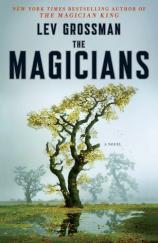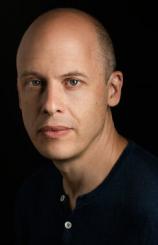The Magicians
Review
The Magicians
I’ll say it now because I pretty much have to: Lev Grossman has written an adult version of Harry Potter. But more accurately, I would say he’s written a fantasy for the post-Harry Potter age. And it deserves to be one of the best fantasy books of the year. After J. K. Rowling got children (and adults) reading fantasy again, the reading world seemed to become newly obsessed with the playful and escapist world of magic in other worlds. But I never was able to get completely wrapped up in the slightly cartoony world of Harry Potter, and no matter how well Rowling presented it, it never felt as directly relevant to my life as I wanted it to. The magician’s world was too distant from our own, their spells too arcane and their lives too, well, magical. I wanted some realism in my fantasy.
THE MAGICIANS chronicles the young adulthood of Quentin Coldwater --- a brilliant, self-hating teenager who has great difficulty being happy from not-so-posh Brooklyn --- from his college interviews to his post-university malaise. After a botched interview (his interviewer is lying dead on the floor), he finds himself transported to upstate New York where he is admitted to Brakebills College of Magical Pedagogy. Grossman makes no attempt to artificially manufacture an over-arching college experience for Quentin (which, as any college student can say, doesn’t really exist); there’s a story there, but it’s less about the struggles and joys of going to college that so dominate the Harry Potter world and more a collection of experiences that define his growing enchantment and disenchantment with the magical world and his personal relationships.
But Quentin’s college years are mainly the background for his life afterward, where a top-notch magical education does nothing to relieve the directionless boredom and depression that often accompanies graduation. Even an adventure to the magical world of Fillory --- previously thought to exist only in a series of children’s books (think Narnia) --- does little to fully realize his happiness, despite fulfilling a childhood fantasy. Though certainly plot-heavy, THE MAGICIANS is really a story about figuring out how to be happy, especially when the greatest challenge is letting oneself feel worthy enough to do so.
With few friends and a childhood filled with a sense of something missing, young Quentin dreams of being transported to a magical elsewhere that will instantly make him happy. And as Grossman draws Quentin into the magical world, we’re as excited to make the journey as Quentin. Grossman knows how to write excellent fantasy, and his writing makes the reader all too eager to jump in. His crisp and clever but voluptuous prose makes for engrossing reading; I must admit to missing my subway stop during a chapter and sneaking in a few pages at the office.
But what makes THE MAGICIANS a post-Harry Potter book is its commentary on the fantasy genre itself. Quentin, as devout a fantasy reader as any of us, is all too willing to be sucked into a new world. But what he finds never lives up to his expectations. In fantasy worlds we can never truly escape the reality of our own lives. And if we as fantasy readers (and citizens of a decidedly non-magical world) expect to ever escape our problems, we’re bound to be sorely disappointed. What’s just as impressive is that Grossman makes this point throughout THE MAGICIANS without ever making it too obvious or devolving into juvenile angst. Quentin is a genuine young character, but his story is told through the tempered voice of adulthood, though a fantastical and slightly Anglophilic one as it may be. And the novel doesn’t carry a trace of cynicism; despite the pessimistic subject matter, we never lose our wide-eyed excitement in Grossman’s glorious storytelling.
Perhaps Grossman’s greatest achievement --- even more than the superb narrative, perfectly genuine dialogue, even pacing, and innovation on well-worn themes --- is how he draws magic into our world. Unlike in Harry Potter, there’s no hidden world of magicians behind a brick wall in a café. Magic is mainly a linguistic and athletic craft, a more trainable skill than method of channeling some abstract power of wizardry. Real, painful and senseless accidents happen at Brakebills. The adventure in Narnia-esque Fillory is overshadowed and distracted by intense personal conflict and grief. And a magician’s greatest enemy isn’t some Luciferian villain, but the boredom that results from a life made all too easy by magic. In one of the novel’s best scenes, Brakebills’s Dean ruminates that people may be better off without magic, as it blurs the line between reality and fantasy. Grossman, in something of an act of daring given the fantasy genre, considers that the power to make any wish come true may not be the best of things. If any of this sounds too clichéd, be assured that Grossman embeds it in a story so fundamentally about the feeling of growing up and growing old that it never feels tired --- just right.
THE MAGICIANS manages to be the perfect fantasy read. It stokes our deep desires to be transported away to another world, delves into some innovative and clever world-building, throws in some adventure, and brings the protagonist to a new understanding of his world and himself. And yet Grossman manages to make it more. He simultaneously sucks the wind out of fantasy’s often-blind enthusiasm while crafting an addicting “just one more chapter!” experience. He constructs a serious literary criticism of the genre and a true-to-life bildungsroman that feels even more genuine than realist works, with real struggles and personal relationships. And he manages to take magic where it rarely goes (or at least rarely goes effectively): into our personal lives.
Reviewed by Max Falkowitz on August 11, 2009





